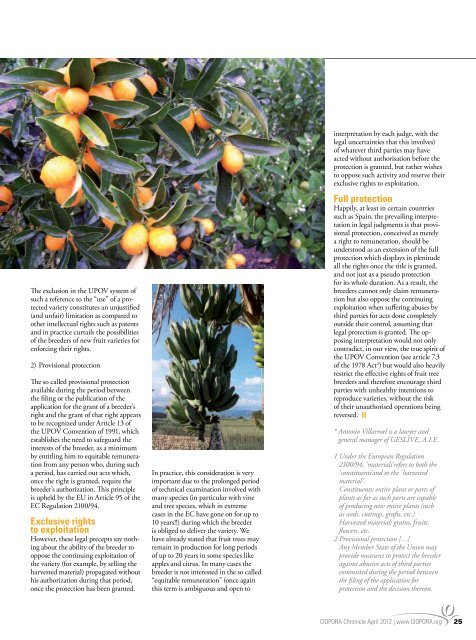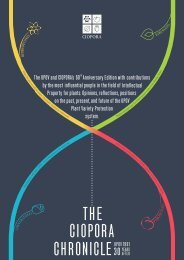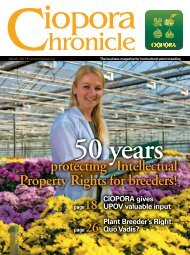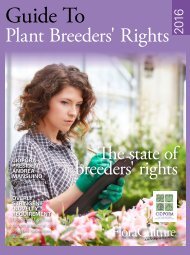2012 CIOPORA Chronicle
CIOPORA annual magazine on Intellectual Property protection for plant innovations 2012. The magazine was produced in cooperation with FloraCulture International. Read in the 2012 CIOPORA Chronicle edition: - Plant Patents in the United States after the America Invents Act - U.S. plant patents compared to UPOV PBR system - Does Belgian patent law need a breeder’s exemption? - How much open access can breeders afford? - IPP and PBR in Chile - IP protection for plant innovations in Canada and much more...
CIOPORA annual magazine on Intellectual Property protection for plant innovations 2012. The magazine was produced in cooperation with FloraCulture International.
Read in the 2012 CIOPORA Chronicle edition:
- Plant Patents in the United States after the America Invents Act
- U.S. plant patents compared to UPOV PBR system
- Does Belgian patent law need a breeder’s exemption?
- How much open access can breeders afford?
- IPP and PBR in Chile
- IP protection for plant innovations in Canada
and much more...
You also want an ePaper? Increase the reach of your titles
YUMPU automatically turns print PDFs into web optimized ePapers that Google loves.
The exclusion in the UPOV system of<br />
such a reference to the “use” of a protected<br />
variety constitutes an unjustified<br />
(and unfair) limitation as compared to<br />
other intellectual rights such as patents<br />
and in practice curtails the possibilities<br />
of the breeders of new fruit varieties for<br />
enforcing their rights.<br />
2) Provisional protection<br />
The so called provisional protection<br />
available during the period between<br />
the filing or the publication of the<br />
application for the grant of a breeder’s<br />
right and the grant of that right appears<br />
to be recognized under Article 13 of<br />
the UPOV Convention of 1991, which<br />
establishes the need to safeguard the<br />
interests of the breeder, as a minimum<br />
by entitling him to equitable remuneration<br />
from any person who, during such<br />
a period, has carried out acts which,<br />
once the right is granted, require the<br />
breeder’s authorization. This principle<br />
is upheld by the EU in Article 95 of the<br />
EC Regulation 2100/94.<br />
Exclusive rights<br />
to exploitation<br />
However, these legal precepts say nothing<br />
about the ability of the breeder to<br />
oppose the continuing exploitation of<br />
the variety (for example, by selling the<br />
harvested material) propagated without<br />
his authorization during that period,<br />
once the protection has been granted.<br />
In practice, this consideration is very<br />
important due to the prolonged period<br />
of technical examination involved with<br />
many species (in particular with vine<br />
and tree species, which in extreme<br />
cases in the EC have gone on for up to<br />
10 years!!) during which the breeder<br />
is obliged to deliver the variety. We<br />
have already stated that fruit trees may<br />
remain in production for long periods<br />
of up to 20 years in some species like<br />
apples and citrus. In many cases the<br />
breeder is not interested in the so called<br />
“equitable remuneration” (once again<br />
this term is ambiguous and open to<br />
interpretation by each judge, with the<br />
legal uncertainties that this involves)<br />
of whatever third parties may have<br />
acted without authorisation before the<br />
protection is granted, but rather wishes<br />
to oppose such activity and reserve their<br />
exclusive rights to exploitation.<br />
Full protection<br />
Happily, at least in certain countries<br />
such as Spain, the prevailing interpretation<br />
in legal judgments is that provisional<br />
protection, conceived as merely<br />
a right to remuneration, should be<br />
understood as an extension of the full<br />
protection which displays in plenitude<br />
all the rights once the title is granted,<br />
and not just as a pseudo protection<br />
for its whole duration. As a result, the<br />
breeders cannot only claim remuneration<br />
but also oppose the continuing<br />
exploitation when suffering abuses by<br />
third parties for acts done completely<br />
outside their control, assuming that<br />
legal protection is granted. The opposing<br />
interpretation would not only<br />
contradict, in our view, the true spirit of<br />
the UPOV Convention (see article 7.3<br />
of the 1978 Act 2 ) but would also heavily<br />
restrict the effective rights of fruit tree<br />
breeders and therefore encourage third<br />
parties with unhealthy intentions to<br />
reproduce varieties, without the risk<br />
of their unauthorised operations being<br />
reversed. |||<br />
* Antonio Villarroel is a lawyer and<br />
general manager of GESLIVE, A.I.E.<br />
1 Under the European Regulation<br />
2100/94, ‘materials’refers to both the<br />
‘constituents’and to the ‘harvested<br />
material’.<br />
Constituents: entire plant or parts of<br />
plants as far as such parts are capable<br />
of producing new entire plants (such<br />
as seeds, cuttings, grafts, etc.)<br />
Harvested material: grains, fruits,<br />
fl owers, etc.<br />
2 Provisional protection […]<br />
Any Member State of the Union may<br />
provide measures to protect the breeder<br />
against abusive acts of third parties<br />
committed during the period between<br />
the filing of the application for<br />
protection and the decision thereon.<br />
<strong>CIOPORA</strong> <strong>Chronicle</strong> April <strong>2012</strong> | www.<strong>CIOPORA</strong>.org 25









